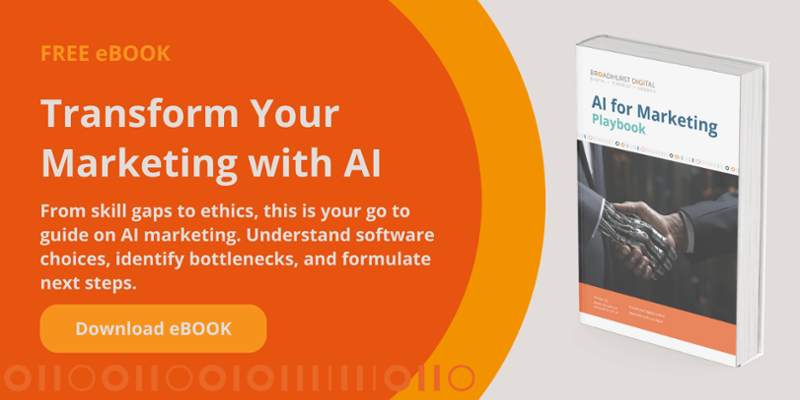Artificial intelligence (AI) is revolutionising the marketing field, and the statistics are there to prove it. From automation to personalisation, AI for marketing is becoming an essential tool for businesses. But how far along is the industry in adopting and benefiting from AI? What are the key statistics defining AI's current state in marketing?
The 2023 State of Marketing AI Report from Marketing AI Institute and Drift offers a comprehensive look into these questions. Here are 10 must-know stats that shed light on the state of AI in marketing today, providing valuable insights for marketers, executives, and anyone interested in the intersection of AI and marketing.
AI is a Top Priority for Marketers This Year
The importance of AI in marketing is undeniable, with 64% of marketers considering AI vital for success in 2023. This statistic reflects a growing trend in the industry, where AI is no longer an optional tool but a critical component in driving marketing strategies. The quote from the report, "Nearly two-thirds of respondents (64%) say AI is either very important or critically important to the success of their marketing over the next 12 months," underscores the urgency and priority placed on AI.
#1 Desired Outcome is Time Savings
Time-saving is at the forefront of AI adoption, with 77% of marketers wanting AI to reduce repetitive tasks. This desire reflects the industry's need for efficiency and the potential for AI to automate mundane tasks, freeing up time for more strategic work. The report's statement, "Most commonly, respondents say they want to reduce time spent on repetitive, data-driven tasks (77%)," highlights this significant trend.
Widespread Personal Use of AI Tools
The personal use of AI tools is widespread among marketers, with 98% already using AI somehow. This finding indicates a comfort level with AI technology and a willingness to experiment and integrate it into daily workflows. The report's observation, "98% of all marketers surveyed say they are already personally using AI in some way—most commonly, they’re experimenting with it (45%)," shows the growing familiarity with AI.
Significant Optimism About AI
Optimism about AI's impact is prevalent, with 64% of marketers having positive feelings. This optimism extends beyond marketing to business and society, reflecting a broader belief in AI's potential benefits. The report's affirmation, "64% of marketers say they have positive feelings about AI’s impact on marketing, business, and society," captures this sentiment.
Slowly Improving AI Confidence Levels
Confidence in evaluating AI technology is slowly improving, though 69% still rate their confidence as medium, low, or none. The increase from 29% to 32% in high/very high confidence since 2022 indicates a gradual growth in understanding and trust in AI. The report's insight, "69% rate their confidence level in evaluating AI-powered marketing technology as medium, low, or none," highlights the ongoing journey towards full confidence.
Most Remain AI Beginners or Intermediates
The majority of marketers are still learning how AI works, with 35% at beginner levels and 54% at intermediate levels. This finding emphasises the complexity of AI and the need for ongoing education and training. The report's statement, "When asked how they classify their understanding of AI, the vast majority of marketers say they’re at beginner (35%) or intermediate (54%) levels," illustrates the learning curve involved.
Companies Lack AI Training and Education
A significant 78% of respondents say their employers offer no internal AI training, pointing to a major barrier in AI adoption. The lack of training and education hinders the full utilisation of AI and slows down progress. The report's warning, "78% of respondents say their employers have no internal AI-focused education or training," emphasises this critical gap.
Few Have Generative AI and Ethics Policies
Just 22% of organisations have generative AI policies, and 21% have an AI ethics policy. This lack of policy reflects the early stages of AI adoption and the need for clear guidelines and principles. The report's observation, "Only 22% of organisations have generative AI policies. And only 21% of organisations have an AI ethics policy or responsible AI principles," highlights an area for improvement.
Concern AI Will Eliminate Marketing Jobs
The concern that AI will eliminate more marketing jobs than create in the next 3 years is shared by 40% of respondents. This concern reflects the uncertainty and fear surrounding AI's impact on the job market. The report's caution, "40% of respondents say AI will eliminate more jobs than it creates over the next 3 years, while 36% say more jobs will be created by AI," captures this complex issue.
CMOs Lag in AI Usage and Confidence
Though CMOs often own marketing AI adoption, they lag in understanding, confidence, and usage. This knowledge gap may hinder organisational progress in AI. The report's note, "Though CMOs play a starring role in AI ownership, they also have gaps in their AI knowledge—gaps that may be partially responsible for why organisations are lagging in AI understanding, training, and strategy," points to a leadership challenge.
The 2023 State of Marketing AI Report paints a multifaceted picture of the current state of AI in marketing. From prioritising AI as a top priority to the optimism and concerns surrounding its impact, these findings offer a rich and nuanced understanding of how AI shapes the marketing landscape.
The statistics reveal a growing reliance on AI to save time and enhance efficiency, yet also highlight the challenges in training, ethics policies, and leadership understanding. The report serves as a wake-up call for organisations to invest in AI education, policy development, and strategic implementation.
As the industry continues to evolve, these insights serve as a roadmap for success and reflect the broader transformation AI brings to marketing. Marketers, executives, and decision-makers must heed these findings to navigate the rapidly changing landscape and leverage AI's full potential.

Comments